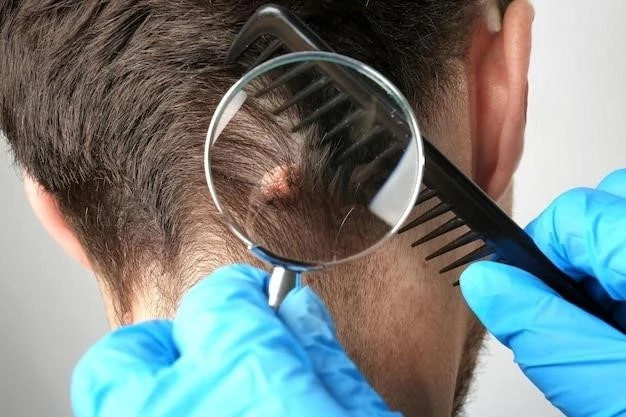Causes of Alopecia Congenita Keratosis Palmoplantaris
Understanding the complex interplay of genetic mutations and environmental factors is crucial․
Genetic Mutations
Specific gene mutations play a pivotal role in the development of Alopecia Congenita Keratosis Palmoplantaris․ Variations in genes like LIPH and GJB6 can disrupt hair follicle formation and maintenance٫ leading to hair loss and skin abnormalities typical of this condition․
Environmental Factors
While genetic mutations are primary, environmental factors can influence the severity and progression of Alopecia Congenita Keratosis Palmoplantaris․ Exposure to certain toxins, chemicals, or stressors may exacerbate hair loss and skin manifestations in individuals predisposed to the condition․
Symptoms and Diagnosis of Alopecia Congenita Keratosis Palmoplantaris
Clinical presentation and specialized tests aid in accurate identification and assessment․
Hair Loss Patterns
The characteristic hair loss patterns in Alopecia Congenita Keratosis Palmoplantaris often involve symmetric bald patches on the scalp, eyebrows, and body․ Understanding the distribution and progression of hair loss aids in the diagnosis and management of this condition․
Skin Changes
Skin changes in Alopecia Congenita Keratosis Palmoplantaris include thickening of palmoplantar skin, hyperkeratosis, and redness․ These alterations are key diagnostic indicators and may contribute to discomfort and functional limitations for individuals affected by this condition․
Diagnostic Tests
Diagnostic tests for Alopecia Congenita Keratosis Palmoplantaris involve skin biopsies, genetic testing, and imaging studies to confirm the diagnosis and assess the extent of hair loss and skin changes․ These tests are essential for a comprehensive evaluation and personalized treatment planning․

Treatment Options for Alopecia Congenita Keratosis Palmoplantaris
Various treatment modalities can help manage symptoms and improve quality of life․
Topical Treatments
Topical treatments like corticosteroids, minoxidil, or retinoids are commonly used to improve hair regrowth and manage skin changes in Alopecia Congenita Keratosis Palmoplantaris․ These medications are applied directly to the affected areas to target specific symptoms and promote healing․
Oral Medications
Oral medications such as systemic corticosteroids, immunosuppressants, or retinoids may be prescribed to address widespread symptoms of Alopecia Congenita Keratosis Palmoplantaris․ These medications work internally to modulate the immune response and improve both hair and skin manifestations․
Surgical Interventions
Surgical interventions like hair transplant procedures or skin grafting may be considered in severe cases of Alopecia Congenita Keratosis Palmoplantaris where other treatment modalities are ineffective․ These surgical options aim to restore hair growth and improve skin health for individuals with advanced disease progression․
Genetic Factors in Alopecia Congenita Keratosis Palmoplantaris
Understanding the inheritance patterns and gene mutations associated is crucial for diagnosis․
Inheritance Patterns
Alopecia Congenita Keratosis Palmoplantaris can follow autosomal recessive or dominant inheritance patterns, with a high likelihood of gene transmission within families․ Understanding the specific inheritance pattern in each case is crucial for genetic counseling and family planning decisions․
Gene Mutations Associated
Gene mutations associated with Alopecia Congenita Keratosis Palmoplantaris include variants in the LIPH and GJB6 genes, impacting hair follicle development and skin integrity․ Understanding the specific gene mutations involved is essential for targeted treatment strategies and genetic counseling․
Management of Alopecia Congenita Keratosis Palmoplantaris
Comprehensive care involves dermatological support and psychological assistance․
Dermatological Care
Dermatological care for Alopecia Congenita Keratosis Palmoplantaris involves a multidisciplinary approach with dermatologists specializing in hair and skin disorders․ Management focuses on symptom control, skin health optimization, and monitoring for any disease progression to enhance the overall well-being of affected individuals․
Psychological Support
Psychological support is essential for individuals with Alopecia Congenita Keratosis Palmoplantaris to address emotional challenges, boost self-esteem, and cope with the impact of the condition on their quality of life․ Counseling, support groups, and therapy can provide valuable assistance in managing psychosocial aspects and promoting mental well-being․
Research Advances in Alopecia Congenita Keratosis Palmoplantaris
Exploration of novel therapies and clinical trials drives progress in managing the condition․
Novel Therapies Under Investigation
Ongoing research is investigating novel therapies for Alopecia Congenita Keratosis Palmoplantaris, including gene therapies, stem cell treatments, and immunomodulatory agents․ These innovative approaches aim to target the root cause of the condition and offer promising prospects for more effective management in the future․
Clinical Trials and Studies
Ongoing clinical trials and research studies are investigating potential new treatments and therapeutic approaches for Alopecia Congenita Keratosis Palmoplantaris․ These systematic investigations aim to evaluate the safety, efficacy, and long-term outcomes of emerging interventions, contributing valuable insights to the field of dermatology and genetic disorders․
Impact of Alopecia Congenita Keratosis Palmoplantaris on Quality of Life
Social and emotional challenges require tailored coping strategies for affected individuals․
Emotional and Social Challenges
The emotional and social challenges faced by individuals with Alopecia Congenita Keratosis Palmoplantaris can include feelings of insecurity, stigma, and social isolation․ Coping with these challenges may require psychological support, education, and a supportive network to navigate the impact on mental well-being and social interactions․
Coping Mechanisms
Developing effective coping mechanisms for managing the challenges of Alopecia Congenita Keratosis Palmoplantaris is essential․ Strategies like building a strong support system, practicing self-care, seeking professional help, and engaging in activities that promote self-esteem and confidence can empower individuals to cope positively with the condition’s impact on their quality of life․
Support and Resources for Individuals with Alopecia Congenita Keratosis Palmoplantaris
Access to patient support groups and educational materials enhances overall well-being․
Patient Support Groups
Engaging with patient support groups provides individuals with Alopecia Congenita Keratosis Palmoplantaris a platform to share experiences, receive empathy, and access valuable resources․ These supportive communities foster solidarity, understanding, and empowerment among members, helping navigate the challenges of the condition more effectively․
Educational Materials and Counseling Services
Access to educational materials and counseling services plays a crucial role in empowering individuals with Alopecia Congenita Keratosis Palmoplantaris․ These resources provide valuable information, emotional support, and coping strategies to enhance understanding, self-esteem, and overall well-being while living with the condition․
